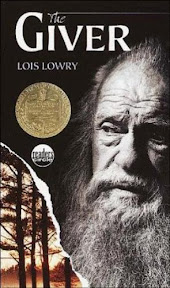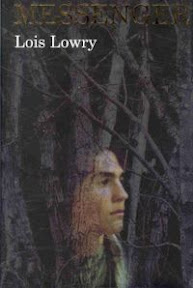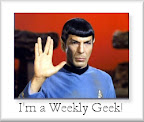 I really had no plans to pick either of these books up. I knew that Lowry had written a sequel of sorts to a favorite childhood book of mine, The Giver, called Gathering Blue. For the Young Adult Reading Challenge, I picked up Gathering Blue (you can read my review here). Then I found out that Lowry had written a third book, Messenger, which united characters from both books. I decided then and there to reserve both The Giver and Messenger from the library, so that I could have the full experience.
I really had no plans to pick either of these books up. I knew that Lowry had written a sequel of sorts to a favorite childhood book of mine, The Giver, called Gathering Blue. For the Young Adult Reading Challenge, I picked up Gathering Blue (you can read my review here). Then I found out that Lowry had written a third book, Messenger, which united characters from both books. I decided then and there to reserve both The Giver and Messenger from the library, so that I could have the full experience.It was a very long time ago that I first read The Giver. The book had just won the Newberry Medal, and I remember very distinctly what an impression this book made on me. If pressed, I would probably categorize The Giver as science fiction, because it is about a utopia, which of course is not quite so perfect as it seems on the surface. The book is deceptively simple. It is written as a children's story, with simple language and uncluttered writing, but rereading it as an adult, I found much more in this profound story than I did as a child.
The Giver's main character is a boy named Jonas, who lives in a perfect society. There is no conflict, poverty, hunger, divorce, injustice, unemployment or inequality. Everyone in the community has their own role; everyone takes pride in their duties. Everyone is safe at all times. As the story opens, Jonas is feeling anxious about the upcoming Ceremony of Twelve where he and the other Elevens are to be given their adult job assignments.
His father explained to Jonas:
..."It's the last of the Ceremonies, as you know. After Twelve, age isn't important. Most of us even lose track of how old we are as time passes, though the information is in the Hall of Open Records, and we could go and look it up if we wanted to. What's important is the preparation for adult life, and the training you'll receive in your Assignment."
Despite the fact they have been observed closely by the Elders in order to select occupations that will match their interests and personalities, Jonas can't figure out what he could possibly be selected for, and the uncertainty bothers him. But at the Ceremony, Jonas is surprised when he is selected for the role of Receiver. He knows that the job is one of great importance to the community, but he is unprepared for what it holds in store for him. He is put in training with an old man he knows only as The Giver. The Giver teaches him that his job is to receive and store all memories of a past before the community and its perfection existed. Exposed to these secrets of his society, Jonas finds that he is terribly burdened and separated from everything and everyone he has ever known.
I think Lowry's genius in this book is in creating characters that the reader genuinely cares about. Jonas never questions the rules of the community until he is given the memories he must receive and learns about both the horrors and the joys that exist outside of his world. Even then, he feels dutiful to his role and makes the decision to sacrifice of himself in order to help others.
The community where Jonas lives is perfectly thought out and detailed. An older reader will suspect right away that things aren't as perfect as they seem in the community (since dystopias after all are a rather popular science fiction topic). Even so the way Lowry shows us first the perfect surface of the society and then gradually exposes us to its flaws is quite elegant.
This book is, of course, also accessible to younger readers as well, since it is designed for them. It might be the first exposure to a science fiction book for a younger reader (I'm pretty sure it was for me) and there is really no better book.
The Giver has become a classic, and deservedly so. If you haven't read it, you have it on my authority that it should be added to your tbr pile asap!
Now on to Messenger. This book picks up from the events at the end of Gathering Blue, but switches narrators. Kira, the main character of Gathering Blue, was learning to find her place as a disabled person in a society that discarded those with imperfections. Matty was Kira's scrappy, mischievous friend, and at the end of the book, he made the decision to leave the place where he and Kira lived, finding his way instead to a different Village where outsiders were welcomed, the helpless and injured are cared for, and everyone lives in harmony. He lives with Kira's father, a blind man called the Seer. His job in the village has been to deliver messages, a role he relishes because of the challenge. Delivering messages frequently takes him through the old Forest. Matty has never had trouble from the Forest, but unwary travelers have been stranded, hurt, and even killed by the Forest.
There is a growing unrest in the Village, though, and Matty must take on his most challenging journey yet. Some of the Villagers have grown tired of taking in new refugees and the borders of the Village are being closed. Before then, Matty must return to his home village and try to convince Kira to return back with him before it is too late.
After recommending both The Giver and Gathering Blue as must-reads, I wish I could say the same for Messenger. It isn't a terrible book, but it just isn't as good as the other two. The Giver and Gathering Blue are connected by the faintest strand, and I'm sure that over the years more than one reader, and perhaps publisher has begged Lowry to connect the two books more concretely. The resulting book feels a bit half-hearted. The characters are there, but the subtle magic that made the previous two books great is just not there. At the end of this book, I had more of a so-what? reaction. If you have read the other two books and liked them, you might want to read this one just to see what happens. Otherwise, as a stand-alone novel, it doesn't hold up.



7 comments:
I made it through my entire childhood and had never heard of The Giver! I'm going to make up for it now as I see this everywhere now. I hope to read all three books at some point this year. I've already got them on the TBR.
I loved The Giver and have taught (or helped teach) it in several college surveys of children's literature, and I even used it in a developmental reading course last semester. I've never really had too much of an immediate urge to pick up the other books although I do have them on my shelves. Everyone I've heard review the trilogy as a whole has sort of so-whatted at Messenger. I'll get 'round to them eventually, but I'm not in any hurry. :) I'll just enjoy re-reading The Giver over and over again. hehe
Okay, thanks to you I have just made reading The Giver this year an official goal :P
I loved The Giver (I just read it last year!) but I have yet to read either of the others. Such a simple tale on the surface, and yet so complex. LOVED it!
Reading The Giver was definitely one of the highlights of my 6th grade experience. :)
Sooo...does The Messenger come last in the "series"? I really enjoyed The Giver but I had a tough time with the ending of it. Not one for ambiguity--at least when *that* much emotion is at stake. Anyway, it's fun to revisit childhood treasures!
natasha-you won't be disappointed! The Giver is a great book and I can practically guarentee you'll enjoy it.
andi-that is cool that you've used it in college courses! I think that it is such an amazing read and should be read by all elementary schools. Yeah Messenger is only so so but if you like the Giver, if nothing else its interesting to see what Lowry imagined happened to him after the events of The Giver.
nymeth-oh good! I know you'll love it for sure!
stephanie-yes, I think that was so genius how the world she created seemed so great on the surface. You find yourself going along with it, until Jonas starts to learn the truth.
giulia-well if its been that long, it is definitely worth a reread!
trish-yeah Messenger is the last book of the series. And yeah, the ending is very open to interpretation. Interestingly, the author does resolve a lot of that in Messenger, despite other flaws.
Post a Comment